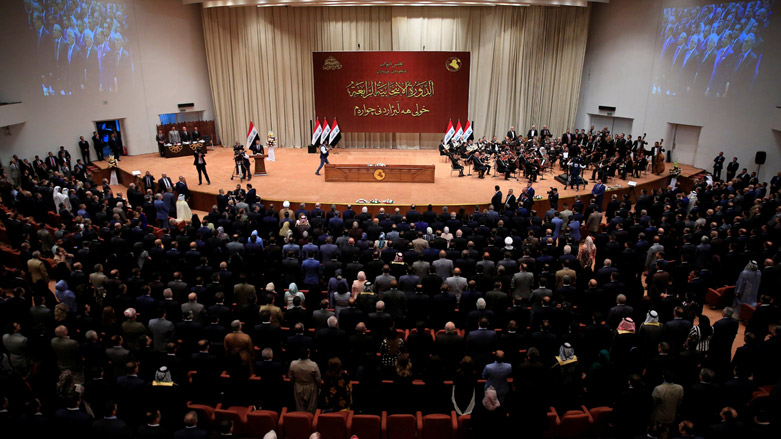Iraqi lawmakers fail to elect Speaker in first parliamentary session

ERBIL (Kurdistan 24) – Iraq’s newly elected lawmakers convened on Monday for the first time since the May 12 national election but failed to elect a speaker, the first step in the process of forming a new government.
The members of parliament are to elect the speaker and two deputies within a 90-day process outlined in the constitution, but as a result of intense competition between the various blocs, no vote was held on the appointments.
A temporary leader in the parliament, which is usually given to the eldest lawmaker until a speaker is elected, will lead the next session on Tuesday.
The members of parliament were sworn in on Monday in a formal ceremony attended by the three incumbent leaders of Iraq: the Speaker, Prime Minister, and President of Iraq.
After taking their oaths, a number of lawmakers left the session, including the members of the leading Kurdish parties: the Kurdistan Democratic Party (KDP) and the Patriotic Union of Kurdistan (PUK).
Parliamentary factions usually negotiate to reach an understanding on the posts of speaker, the prime minister, and the president of Iraq before convening in parliament, but negotiations are currently still ongoing, and there have been no agreements, so far, on the candidates.
On Sunday, Iraq’s two Shia rivals announced they had each developed alliances in the Iraqi parliament capable of forming a government after months of negotiations following the May 12 parliamentary election.
There are intense rivalries between the two main Shia coalitions who are vying to form the largest parliamentary bloc and lead the new government. The two contenders are the al-Fatih and State of Law coalition, led by Hadi al-Amiri and Nouri al-Maliki, and the Sairoon-led bloc, allied with the Nasr (Victory) coalition, headed by cleric Muqtada al-Sadr and Prime Minister Haider al-Abadi respectively.
The announcements came a day ahead of the first parliamentary session.
Iraq held nationwide parliamentary elections on May 12. The ratification of results was delayed for months due to a contentious recount process over allegations of fraud and vote rigging.
The new Iraqi government would be tasked with rebuilding the country after a three-year war against the Islamic State (IS) and balancing relations between Iraq’s biggest allies, Iran and the US.
According to an informal system of power-sharing in Iraq, the Prime Minister’s post is held by a member of the Shia community, a Sunni Iraqi is speaker of parliament, and a Kurd holds the presidency.
Editing by Nadia Riva
